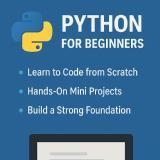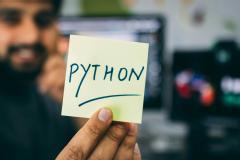📘 Course: Python for Beginners
👥 Who This Class is For?
- Absolute beginners with no prior programming knowledge.
- Students from non-technical backgrounds who want to learn coding basics.
- School and college students looking to strengthen programming fundamentals.
- Professionals wanting to start a career in programming, data science, AI, or web development.
- Anyone curious about learning how to code and solve problems with Python.
🎯 What Students Will Learn
By the end of this course, students will be able to:
- Understand Python Basics
- Installing Python & setting up environment
- Writing and running Python programs
- Python syntax, indentation, and comments
- Work with Variables and Data Types
- Numbers, strings, booleans
- Lists, tuples, sets, and dictionaries
- Apply Control Flow
- Conditional statements (if, else, elif)
- Loops (for, while)
- Nested conditions and loops
- Use Functions
- Creating and using functions
- Function arguments and return values
- Built-in functions
- Handle Input and Output
- Reading user input
- Printing formatted outputs
- Working with files (read/write basics)
- Introduction to Error Handling
- Understanding common errors
- Try/except basics
- Mini Projects & Hands-on Practice
- Calculator program
- Guess-the-number game
- Simple text-based applications
✅ Outcome:
Students will gain confidence in writing Python programs, solving basic problems, and be prepared to explore advanced topics like object-oriented programming, web development, and data science.
Perfect 👍 Here’s a structured weekly syllabus (6 weeks) for your Python for Beginners course:
📘 Python for Beginners – 6-Week Course Syllabus
Week 1: Introduction & Basics
- What is Python? Why learn it?
- Installing Python & setting up IDE (IDLE, VS Code, or Jupyter Notebook)
- Writing your first program (Hello World!)
- Python syntax, indentation, and comments
- Variables and data types (numbers, strings, booleans)
- Hands-on: Write simple print & input-based programs
Week 2: Operators & Control Flow
- Arithmetic, comparison, logical, and assignment operators
- String operations (concatenation, slicing, formatting)
- Conditional statements: if, elif, else
- Loops: for, while, break, continue
- Hands-on: Even/odd checker, multiplication table, simple menu program
Week 3: Data Structures
- Lists: creation, indexing, slicing, and methods
- Tuples: immutable sequences
- Sets: unique elements, set operations
- Dictionaries: key-value pairs, accessing and updating
- Hands-on: Student gradebook, shopping cart simulation
Week 4: Functions & Modular Programming
- Defining and calling functions
- Function arguments & return values
- Built-in functions (len(), range(), max(), etc.)
- Importing and using modules (e.g., math, random)
- Hands-on: Calculator function, random number generator
Week 5: File Handling & Error Handling
- Reading and writing text files
- Understanding file modes (r, w, a)
- Introduction to exceptions
- Using try, except, and finally
- Hands-on: Save user input to a file, read from file, handle errors gracefully
Week 6: Mini Projects & Wrap-up
- Project 1: Guess the Number Game
- Project 2: Simple Contact Book
- Project 3: Basic Calculator (with file logging)
- Review of all key concepts
- Next steps: Introduction to OOP, web development, or data analysis with Python
✅ Final Outcome:
Students will complete 3 mini projects, understand all Python basics, and be confident in solving beginner-level programming problems. They’ll also be ready for intermediate topics like object-oriented programming, libraries (NumPy, Pandas), and real-world applications.







